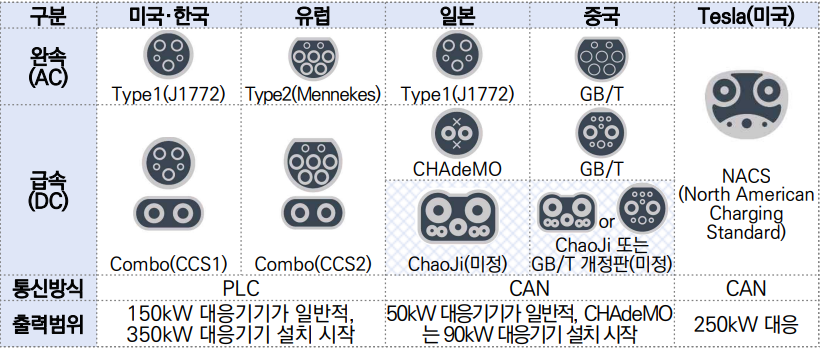일본의 CHAdeMO의 시장점유율이 주춤하는 사이 한국, 미국, 유럽의 급속충전 표준규격인 CCS(이하 Combo)가 글로벌 표준이 되어가고 있다는 보고가 나왔다.
 한·미·유럽 표준규격 Combo 점유율, 일본 CHAdeMO 역전
한·미·유럽 표준규격 Combo 점유율, 일본 CHAdeMO 역전
CHAdeMO 보급 주축 Nissan, 급속충전 표준 Combo 전환
일본의 CHAdeMO의 시장점유율이 주춤하는 사이 한국, 미국, 유럽의 급속충전 표준규격인 CCS(이하 Combo)가 글로벌 표준이 되어가고 있다는 보고가 나왔다.
한국자동차연구원(이하 한자연)의 ‘전기차 급속충전 규격 표준화 동향과 시사점’ 산업동향 보고서에 따르면 초기에는 가장 먼저 개발된 CHAdeMO의 시장점유율이 높았으나, 일본이 전기차 및 충전기술 개발에 소극적으로 임하던 사이에 Combo가 역전했다고 전했다.
급속충전 표준규격은 미국·유럽·우리나라의 CCS(이하 Combo), 일본의 CHAdeMO, 중국의 GB/T 외에 Tesla의 독자규격이 병존하고 있으며, 규격 통일 시 편의성 향상·비용 절감 가능하다.
Combo 타입은 1개의 충전구로 완속·급속·비상 급속충전을 할 수 있고 CHAdeMO, GB/T에 비해 고출력 충전기 보급 측면에서 앞서 있어 급속충전 속도가 더 빨라 편의성이 높고 Combo1, Combo2로 세분되나 동일한 신호 protocol을 사용하여 호환성이 좋다는 장점이 있다.
반면 PLC 통신방식을 사용, 충전 시 배터리 잔량·충전 속도 등 정보를 충전기와 공유하지만 주파수 간섭이 발생할 경우 충전정보를 원활히 제공할 수 없다는 단점도 있다.
지난해 Precedence Research의 분석에 따르면 글로벌 충전기 시장점유율(금액 기준)은 2021년, 2025년, 2027년 Combo가 38.7%, 44.9%, 48.0%로 성장하는데 비해 CHAdeMO는 27.5%, 21.5%, 18.5%로 감소할 전망이다.
CHAdeMO 개발·보급 주축이었던 Nissan이 최근 ‘ARIYA’ 급속충전 표준을 Combo로 전환했는데, 이는 CHAdeMO 측의 추진동력이 저하되었으며 열세를 뒤집기 어렵다는 점을 명확히 보여주는 사례다.
Tesla는 유럽에서는 이미 Combo와 호환성을 확보, 미국에서는 배타적 전략을 고수해왔으나 ‘국가 전기차 인프라(NEVI)’ 사업의 보조금 적격 요건을 충족하기 위해 Combo와 호환성 강화 중이다.
국가 전기차 인프라(NEVI)사업을 통해 미국 정부는 지난해부터 5년간 75억달러를 전기차 충전기 설치 보조금으로 지출할 예정인데, 보조금을 받기 위해서는 Combo 충전기를 설치해야 하기 때문이다.
한자연은 신흥국 시장 내 급속충전 인프라 구축이 한국 기업에 오히려 불리한 요소로 작용하지 않도록 국제협력 강화가 필요하다고 전했다.
신흥국은 장기 전략 없이 가격에만 근거하여 전기차·충전기를 보급할 가능성이 있으며, 만일 중국의 GB/T 또는 ChaoJi 규격이 신흥국 시장의 주류가 된다면 우리 기업에 불리한 요소로 작용할 수 있다는 주장이다.
일례로 中 상하이GM우링은 인니향 ‘Wuling Air EV’에 GB/T를 적용했는데 해당 모델은 가격경쟁력에 힘입어 2022년 전기차 판매량 1위를 기록했으며, 현대차 ‘IONIQ5’는 2위로 정상을 놓쳤다.
따라서 한자연은 전기차 현지생산·수출육성책을 펼치기 시작한 신흥국에, 국제공급망에 편입하기 위해서는 글로벌 표준인 Combo 규격 보급이 필수적이라는 점을 국제협력을 통해 전달할 필요가 있다고 강조했다.
